-
How Often Should I Replace the Pool Water?
Even with an effective pool filtration system, you will want to periodically replace the water as part of your pool maintenance plan. Your pool contractor in Salt Lake City can tell you how often the water should be replaced in your pool, based on the manufacturer’s recommendations and how often you plan to use the pool.
Generally, pool water needs to be replaced once every five to seven years. This should be done during mild weather so that your pool surface is not at risk from strong sunlight and heat. Your pool maintenance company can recommend when it is time to drain your pool. Keep in mind that you can minimize the number of times your pool needs to be drained by sticking to a regular swimming pool maintenance schedule, which will help to control the levels of potentially damaging elements in your pool water. Because pool drainage can be complex and doing so at the wrong time can damage the pool, it’s generally best to allow your pool maintenance company to perform the task for you.
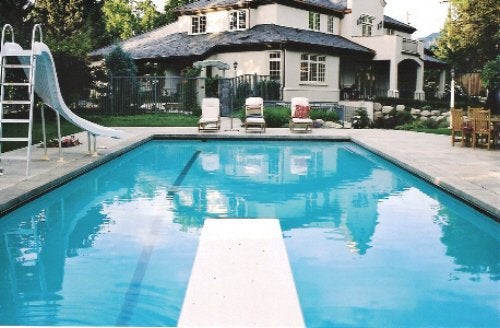
-
Quick Tips for Adding Chemicals to a Hot Tub
After your hot tub installation in Salt Lake City , adding chemicals to it regularly will help to ensure that you can continue to enjoy it for many years to come. To learn the right way to add chemicals to your hot tub, watch this video.
To add chemicals, make sure your jets are turned on. Measure the chemicals you are adding and sprinkle them across the surface of the water. The jets will help spread the chemicals through the water. Leave the jets running with the hot tub cover off for about 15 minutes to make sure that the chemicals are appropriately distributed throughout the water.
-
Essential Steps in Caring for Your Solid Pool Cover
After your pool installation in Salt Lake City, using your pool cover the right way will protect your investment. As you need regular swimming pool maintenance , your cover will also need some special attention now and then to ensure that it stays in good condition and protects your pool properly. If you have a sold pool cover, follow these steps to care for it.
Spot Check Your Water Line
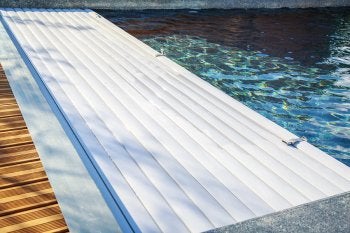
Your water line is important to more than your skimming system. If there is heavy debris on the surface of your solid cover, such as snow, water from heavy rains, or limbs, and the water line is so low that it doesn’t support your cover from underneath, then your pool cover can become damaged or wear out sooner than it otherwise would. When your pool is not in use for long periods of time, periodically perform water level checks to prevent excessive stain on your pool cover.
Prevent Chemical Damage
The chemicals you put in your pool to keep the water clean and balanced could cause damage to your swimming pool cover. When you add chemicals, avoid putting the cover on for at least two hours. This will allow the chemicals to dissolve in the water and the levels to balance out. If you put your pool cover on right after treating your water, the chemicals could still be sitting on the surface of the water and damage the pool cover.
Clean Your Pool Cover
Your pool cover should be cleaned about once every three to six months. Use mild dish soap and a hose to wet the surface, and then scrub it with a pool brush. Rinse the soap off and use a cover pump on the liner to get rid any water that accumulates. If you notice any mold growth, wash the affected area with diluted bleach, being sure to rinse it off completely. You can reduce the chances of mold growth by making sure your cover is dry before storing it.
-
Waterfalls: The Feature You Didn’t Know You Needed for Your New Pool
Your new swimming pool should be your own private sanctuary. It’s where you’ll go to relax and ignore the rest of the world for a little while. So why not take it a step further by adding a feature that epitomizes peace and tranquility? Waterfalls are a surprisingly affordable addition to any home swimming pool installation in Salt Lake City. Even if your in-ground pool has already been installed, you can still get back in touch with the pool contractor to inquire about adding a waterfall.
Meditative Sounds

The pleasant sounds of babbling brooks and cascading waterfalls are frequently the stars of musical arrangements intended for meditation. Even if you aren’t interested in meditating, there’s no question that the soothing sounds of your own private waterfall at your swimming pool can help you unwind from the stress of daily life.Visual Aesthetics
Your poolside waterfall can be custom designed and built to your exact preferences. It can be as simple or complex as you wish. Some families love the clean lines of sleek, modern design, while others prefer the natural look of rough-hewn stone. If you plan to construct a tall, expansive waterfall of natural stone, you could have the water directed to flow gracefully off multiple levels.
Leisurely Recreation
Any child who loves to swim will enjoy ducking through a beautiful waterfall—after all, a backyard waterfall far surpasses running through a sprinkler in the backyard. Plus, any pool party your child decides to host will be sure to be a success.
Natural Filtration
Waterfalls are the height of poolside luxury, but they also offer practical benefits. They churn the water continuously, which supports the pool’s filtration system. A waterfall is also an algae deterrent, as algae is more apt to accumulate in still water.
Installation Enhancements
Your poolside waterfall can be as unique as your own sense of style. Consider adding some enhancements to it, as well. If you’ve chosen natural stone for your waterfall, you might add a small stone staircase at one side of the waterfall to provide access to a slide on the other side. Add some dwarf shrubs for greenery, or consider adding a fire feature nearby.
-
How Long Does It Take to Build an In-Ground Pool?
When you hire a pool contractor in Salt Lake City, he or she can give you a rough estimate of the time it’ll take before you can take a dip in your new pool . The length of time depends on the type and size of in-ground pool you’re having built. In general, most concrete pools can be installed in four to six weeks. Vinyl swimming pool installation takes about two to five weeks.
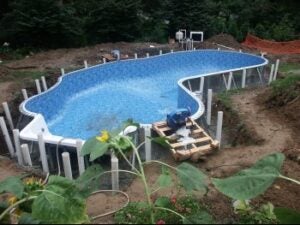
The length of time you’ll need to wait depends on a number of factors, including how long it takes to get the right permits from your municipality. Some local government agencies take longer than others to issue them, and the pool contractor can’t start until a permit is issued. The excavation may take just a day or two, or up to a week if there are utility lines in the area. Then, it may take one to two weeks to lay the steel, and install systems like plumbing and electrical. After this, the actual pool can be installed in one to three weeks, depending on the type of pool you’ve chosen. After this point, all that remains to be done are your preferred finishing touches, like the deck installation, landscaping, custom lighting, as well as any additional features like waterfalls.
-
Are You Backwashing Your Sand Filter Properly?
Swimming pool companies in Salt Lake City recommend backwashing the sand filter about every week, or more frequently if your pool gets a great deal of use. Ideally, you should do this pool maintenance task right after you vacuum your pool. Watch this quick video for a demonstration of the proper way to backwash a sand filter.
This pool maintenance expert directs viewers to turn off the sand filter, and then affix the backwash hose to the backwash nozzle. Screw on a hose clamp, and adjust the multiport valve from the filter setting to the backwash setting. It should run for about a minute. Then, you’ll adjust the setting to rinse, and finally turn the setting to filter. Once you’ve completed these steps, your lap pool is ready for use again.
-
Don’t Neglect These Basics When You Become a New Hot Tub Owner
There’s nothing quite like a relaxing dip in a hot tub on a chilly evening. If you’re anticipating an upcoming hot tub installation at your home near Salt Lake City, there are a few things you should know. First, read the owner’s manual thoroughly, and ask the hot tub installation expert if the company also offers maintenance services. Since there’s a sharp learning curve to owning and caring for a hot tub, having the experts perform maintenance tasks may be preferable for you.
Safety and Energy Efficiency
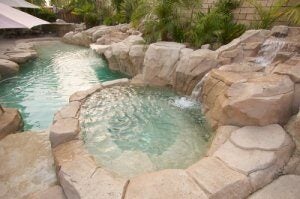
For safety’s sake, don’t exceed the maximum temperature listed in the owner’s manual. If you have kids, your hot tub shouldn’t exceed 100 ºF. Invest in a high-quality, insulated hot tub cover for both safety reasons and energy efficiency. Your hot tub should be covered and locked whenever you aren’t using it. Even if you don’t have kids, restricting access with a lockable cover can protect curious kids and pets from throughout the neighborhood.
Chemistry
Hot tub chemistry isn’t identical to swimming pool chemistry. You could use chlorine for a hot tub, but you probably won’t want to. When it’s mixed with very hot water, chlorine treatments give off a strong, unpleasant odor. Many hot tub owners prefer to use bromine or alternatives like biguanide sanitizer or mineral systems. Refer to your owner’s manual or hot tub installer for in-depth advice on pH levels, calcium hardness, clarifiers, and cleaners. Remember to drain and replace the water in your hot tub about every three to four months.
Filtration
Every new hot tub owner should know where the filter is. Remove it and clean it once weekly, and replace it entirely at least every year. Staying on top of your filter maintenance will help prevent costly damage to the hot tub.
Enjoyment
Hot tub maintenance shouldn’t take up too much of your time, but you might prefer to have a professional handle it for you, regardless. After all, you’ll want to give yourself plenty of time to get the most enjoyment out of your new water feature. Try a nice long soak before bedtime to help you fall asleep faster, and go for a dip whenever your muscles feel tense. In addition, once your spa is installed, you might notice that family and friends start to hint that they’d like an invitation, so consider keeping spare towels, swimsuits, and robes on hand for last-minute guests.
-
Why Temperature Maintenance Matters for Your Hot Tub
A hot tub is a small pool that you can usually keep open for a longer stretch of the year than your full swimming pool. Hot tub installation near Salt Lake City isn’t the end of the journey, though, and you will need to maintain the hot tub to prevent it from sustaining damage. Help your hot tub last for as long as possible by providing it with the right maintenance. You should pay particular attention to the temperature of the water, as it will be flowing through the pipes attached to your hot tub in both directions. Continue reading and find out why temperature maintenance really matters for your hot tub.
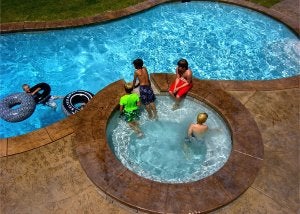
You probably won’t ever have to worry about the pipes going in and out of your hot tub freezing during the summer months, but it’s not out of the question when the winter comes around again. Maintaining a consistent temperature in your hot tub keeps the water from freezing and obstructing your pipes. This helps prevent clogs and pipe leaks, which could otherwise turn into real plumbing disasters. It’s also nice to take a dip in the hot tub in January, especially if you know the water will be warm.
-
Fighting Back Against Odors on Your Spa Cover
Your hot tub cover near Salt Lake City can start to get grimy if you don’t take care of it, and you might even notice odors coming from the pool area. Hot tubs contain water at ideal temperatures for bacterial growth, which can make for a dangerous situation. Watch this video on fighting back against odors on your spa cover.
The smell from your hot tub could be due to mold or mildew, which might occur if you don’t balance your water chemistry. Balancing your pH, alkalinity, and sanitizer levels can keep your cover smelling fresh. You also need to remove and clean your hot tub cover every occasionally, and remember to rinse it off and let it dry before you put it back on your pool. If your spa cover is looking like it’s already outlasted its lifespan, talk to your pool professionals and get a new one.
-
Is Your Pool Ready for Winter?
A new swimming pool installation serving Salt Lake City may change the way you enjoy your summers. What you might not have thought about is how you can get it ready for the winter. You can start by taking out floats, toys, and any minor water features that might be floating around, and then you can focus on the smaller debris and contaminants that have found their way into the pool. Don’t choose a pool cover just because it’s on sale, because a low-quality cover might not do a great job of protecting your investment throughout the offseason. Read ahead and find out if your pool is ready for winter.
Take Everything Out

By the end of the summer, you might have accumulated a hefty inventory of pool toys. Before you can shut your pool down for the winter, you need to get everything out of the water. This means all pool noodles, floats, volleyball nets, and floating filters need to come out. Take out removable ladders as well, and give the pool a good sweep for any stray diving toys that might have been left behind. You should not have anything but water in your pool when you fully close it for the season.
Clean the Water
Since you shouldn’t have anything in your water by the time you put the lid on the pool, all the bugs, leaves, and debris should be gone too. Skim and vacuum your pool until the water looks clearer, and then focus your attention the chemical balance. The pH level, alkalinity, and calcium hardness all need to be in balance for your pool to make it through the winter. Clean the walls and floor of your pool, and empty out filters and pumps that may still contain water and debris.
Cover It Up
Once you have properly tended to your pool, the final step in winterization is closing it. Find a sturdy, dependable pool cover that’s strong enough to support the weight of a child or animal in case any accidents happen. In this case, the right cover can save lives.
RECENT POSTS
categories
- Uncategorized
- Hot Tub Installation
- Swimming Pool Installations
- Swimming Pool Design
- In Ground Pools
- Swimming Pool Maintenance
- Swimming Pool Service
- Swimming Pool Repair
- Outdoor Fireplace
- Outdoor Fire Pit
- Pool Safety
- Deep Blue Pools and Spas
- Exercise
- Swimming
- Outdoor Kitchen
- Pool Chemicals
- Chlorine Levels
- Water Feature
- Burning Calories
- Pool Contractor
